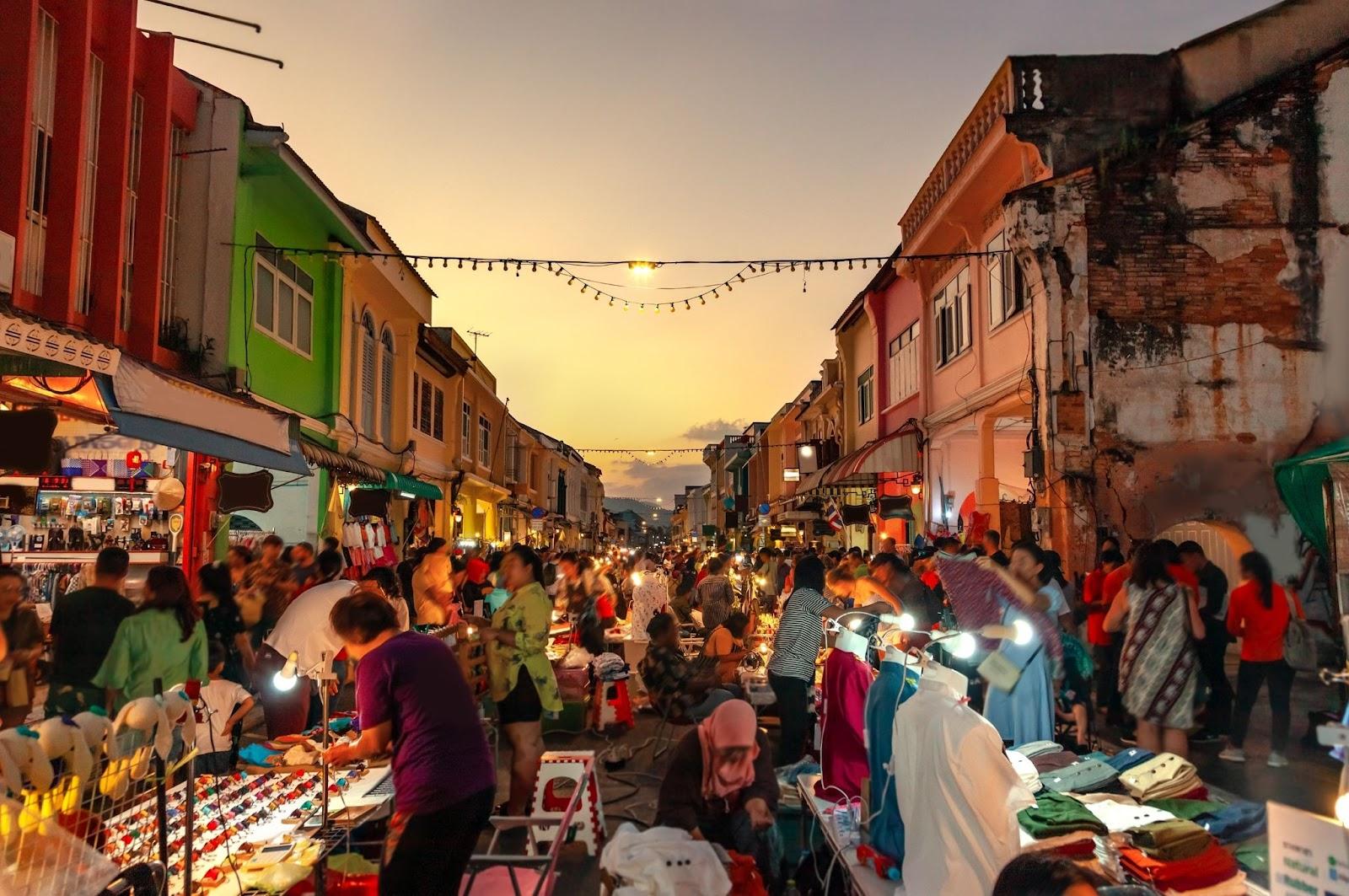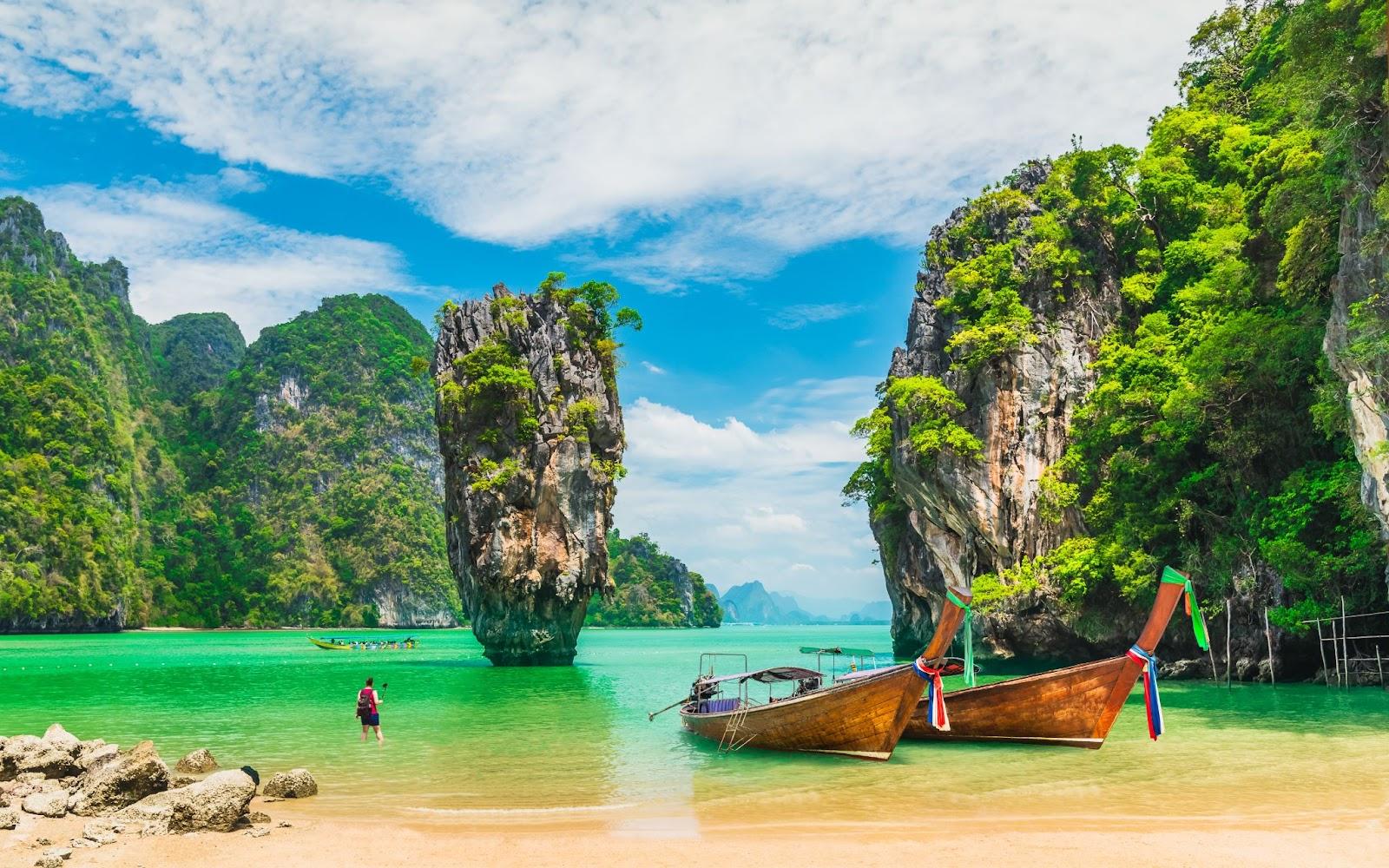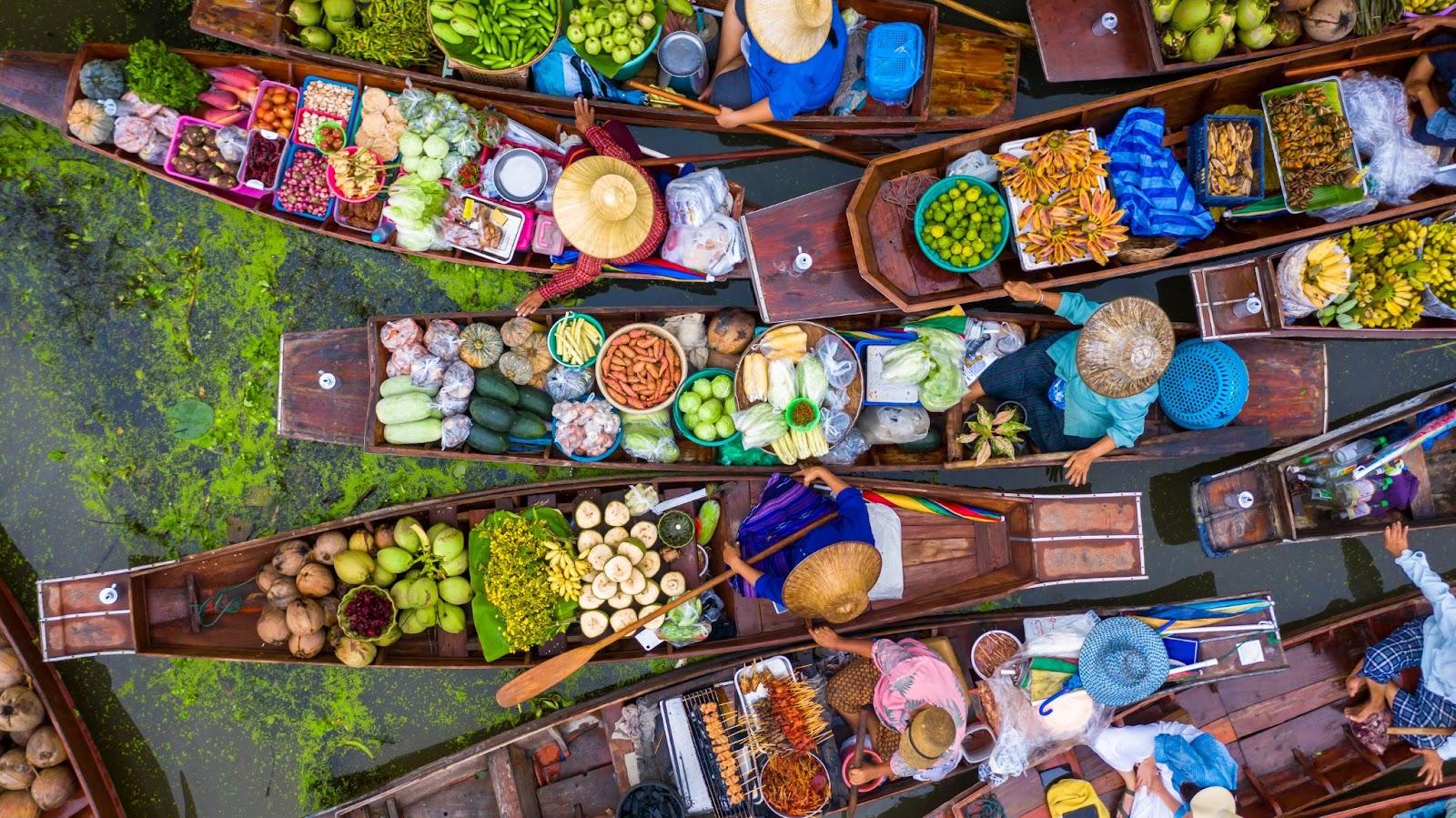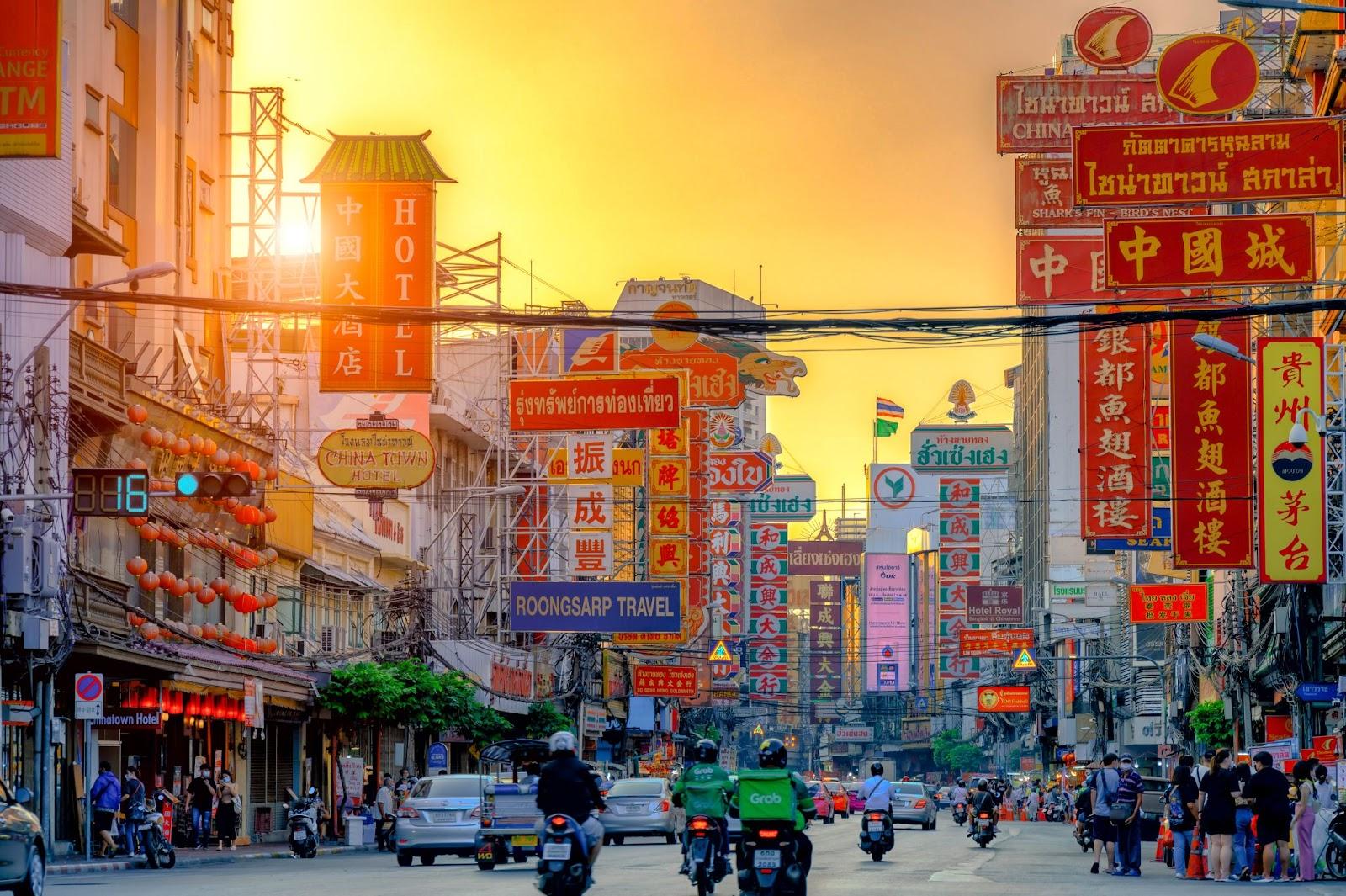 Get
Get
Thai Baht Fast!
- Free home delivery over £750
- with Royal Mail Special Delivery 1pm
- Better rates than the banks

Planning a trip to Thailand?
Secure the best rates when you order Thai baht online
Gear up for an exhilarating Thai adventure! At Manor FX, we’ve sorted your Thai baht, ensuring you can enjoy your trip fully. Thanks to our fantastic sterling to Thai baht exchange rates, you’ll get more THB to spend on your trip.
We offer secure delivery of Thai baht banknotes to your doorstep or office. Or, if you’re up for it, stop by our Manor FX bureau near Heathrow to pick them up in person.
With Manor FX, you’ll experience super-fast delivery and a straightforward online ordering process for your Thai travel money. Convert your GBP to THB with us; we’re here to make your Thailand trip unforgettable!
Thai travel money
Set off on your Thailand adventure well-equipped. Here’s some helpful info about currency and card payments in Thailand.
Can you buy Thai baht in the UK?
Yes, but you won’t find Thai baht in every bank or post office.
The best place to buy Thai baht in the UK is online, using our secure and user-friendly website. You can quickly and easily change your sterling to baht.
Buy your baht now

What is the best way to buy Thai baht?
Traditional options like banks and the Post Office may fall short but don’t worry. We offer the best Thai baht exchange rate in the UK.
Change pound to Thai baht with the added convenience of getting your travel money delivered to your door.
If you need Thai baht immediately, you might find it at airport currency exchange kiosks. Be mindful, though, that you’ll get poor exchange rates there.
Online platforms like ours are the best way to get the best exchange rate for Thai baht.
Is it better to exchange money before going to Thailand?
Yes. It’s wise to exchange some sterling to baht before heading to Thailand. Having Thai baht on hand is incredibly helpful for small purchases and initial expenses upon arrival.
Using local currency ensures smooth transactions, especially in local markets and smaller shops.
Exchanging money beforehand lets you benefit from better exchange rates than at airports. This maximises your currency’s value.
What is the best currency to take to Thailand?
The best currency to take to Thailand is the Thai baht (THB). The local currency is accepted everywhere across the country.
Carrying Thai baht simplifies transactions, especially for paying street vendors where cards might not be accepted.
Carrying some British pounds (GBP) is also a good idea. They can be easily exchanged into Thai baht at numerous currency exchange counters throughout Thailand.
This is particularly useful if you run out of Thai baht or in case of emergencies.

Should I carry cash or a card in Thailand?
In Thailand, it’s wise to carry both cash and a card. Here’s why:
- Cash is king. Cash is essential in Thailand, especially for smaller transactions. Many local markets, street food vendors, and smaller shops prefer or only accept cash. Having Thai baht on hand is convenient for these everyday purchases.
- Cards for larger expenses. Credit and debit cards are widely accepted in larger cities, at major tourist spots, hotels, and upscale restaurants. They’re useful for more substantial expenses or when you prefer not to carry a lot of cash.
- ATM availability. ATMs are widely available, especially in urban areas. However, be aware of fees for withdrawals and currency conversion charges.
- Back-up option. Having a card as a backup is practical. A card can be a lifesaver if you run out of cash or face an unexpected expense.
- Safety. Carrying a large amount of cash can be risky. Use a card where possible to reduce the amount of cash you need to carry.
- Inform your bank. Before travelling, inform your bank of your travel plans to avoid your card being blocked for suspected fraud.
Balancing your use of cash and card is the key. Use cash for everyday small expenses and a card for larger purchases or bookings.
This approach ensures convenience and safety throughout your trip to Thailand.
Can I use my ATM card in Thailand?
Yes, you can use your ATM card in Thailand, but there are several important points to consider:
- Compatibility. Check if your ATM card is compatible with international ATMs. Cards with Visa, MasterCard, Cirrus, or Maestro logos are widely accepted.
- Fees. Be aware of fees for international transactions and currency conversions. These fees can mount up, so it’s essential to understand your bank’s charges for using your card abroad.
- Withdrawal limits: Thailand may have different withdrawal limits than your home country. These limits can vary between banks and locations.
- Inform your bank: Notify your bank about your travel plans. This prevents your card from being blocked because of sudden foreign transactions.
- Exchange rates. ATMs in Thailand will offer to do the currency conversion for you (a service called Dynamic Currency Conversion). However, it’s usually better to be charged in Thai Baht. This lets your home bank handle the conversion, often resulting in a better rate.
- Security. Always be cautious when using ATMs. Use machines in secure, well-lit locations, and shield your pin entry.
- Emergency contacts. Have your bank’s international contact number handy in case your card is lost or stolen.
While using your ATM card can be convenient, having some cash in Thai Baht is also advisable for places that don’t accept cards. Balancing the use of your card and cash will give you flexibility and security during your stay in Thailand.

Is Thailand expensive for tourists?
Thailand is quite affordable. The cost of living is lower compared to the UK. A coffee might cost around 50 THB (roughly £1.20). A three-course meal in a mid-range restaurant could be about 300 THB (approximately £7).
These attractive prices make Thailand a budget-friendly destination, offering great value for money. Our website is ready to assist you with all your currency needs for your UK to Thailand trip.
Do you tip in Thailand?
Tipping isn’t mandatory in Thailand, but it’s a nice gesture for good service. A tip of 10% is common in restaurants and for services.
Because of modest wages, your tips are greatly appreciated. Avoid tipping with coins, as they’re not commonly used.
How much baht should I take to Thailand?
The amount of Thai baht (THB) you should take to Thailand depends on various factors. Things like the length of your stay, your planned activities, and your spending habits all have an effect.
Here’s a general guideline to help you estimate:
Daily expenses:
- Budget travellers: 1,000 – 1,500 THB daily (approx. £25 – £38).
- Mid-range travellers: 2,000 – 3,000 THB per day (approx. £50 – £75).
- Luxury experience: 4,000 THB or more daily (approx. £100 or more).
Accommodation:
- Budget: 300 – 600 THB per night (approx. £7.50 – £15).
- Mid-range: 1,000 – 2,500 THB (approx. £25 – £62).
- Luxury: 3,000 THB and upwards (approx. £75 and up).
Food:
- Street food: 30 – 70 THB (approx. £0.75 – £1.75).
- Mid-range restaurant: 150 – 300 THB per person (approx. £3.75 – £7.50 GBP).
- Fine dining: 500 THB upwards (approx. £12.50 and up).
Transport:
Local transport: A few tens to a few hundred baht, depending on distance (approx. £1 – £5 for most common trips).
Activities:
Attraction entrance fees: 100 – 500 THB (approx. £2.50 – £12.50).
Emergencies:
Around 10-20% of your estimated budget could be a good buffer.
These conversions are approximate and based on a rough exchange rate of 1 THB = 0.025 GBP. Exchange rates fluctuate, so it’s always a good idea to check for the latest rates closer to your travel date.
Remember, these are general estimates. Your actual spending may vary based on personal choices and unexpected expenses.

Buy your baht now
Thai Currency
Banknotes in Thailand
Banknotes in Thailand are vibrant and functional, reflecting the country’s rich culture and reverence for the monarchy. They come in various denominations, each distinguished by its unique colour and design.
The denominations start from the 20 baht note, predominantly green, and ascend to the blue 50 baht, red 100 baht, purple 500 baht, and brown 1,000 baht note, the highest denomination available. This colour-coding system helps in the quick identification of different values.
On the front of each note is the image of King Maha Vajiralongkorn, the current monarch. This shows the deep respect for the royal family in Thailand. The reverse side of each note typically features important Thai cultural and historical landmarks.
All current notes are post-2006. Avoid accepting older, outdated banknotes.

Thai coins
Thai coins play a crucial role in everyday monetary transactions in Thailand, complementing the banknotes. These coins come in several denominations. They’re known for their distinct designs that reflect the country’s culture and monarchy.
The denominations of Thai coins include the 1, 2, 5, and 10 baht coins. Each coin features the image of King Maha Vajiralongkorn, symbolising the monarchy’s significant role in Thai society.
The reverse sides of the coins often depict temples, historical figures, or important cultural symbols, showcasing Thailand’s rich history and heritage.
These coins are frequently used in daily life for small transactions, such as in local markets, public transport, or street food.
Their varied sizes and distinctive designs make them easy to identify and use

Thai currency import and export regulations
Import regulations
Travellers entering Thailand can bring in foreign currency without any restrictions. However, if you carry foreign currency equivalent to or exceeding 20,000 US Dollars (or equivalent in other currencies), you must declare it.
Export regulations
When leaving Thailand, the rules are similar. You can take out foreign currency without any limit. However, a declaration is required for amounts equivalent to or exceeding 20,000 US Dollars.
As for Thai baht, you can take out up to 50,000 baht per person or 100,000 baht per family without declaration.
Ordering Thai baht online
Get the best Thai baht rate and conveniently buy Thai baht online. Have them swiftly and securely delivered to your home or office through Royal Mail Special Delivery Guaranteed®.
Alternatively, you can collect them from our travel money shop near Heathrow. Click here to purchase Thai baht online.
Selling back Thai baht
If you have leftover Thai baht to sell, we can help! To convert Thai baht to GBP, just follow this link. Click on ‘sell currency’ and select ‘THB Thai baht’. We offer competitive rates to convert Thai baht to pounds.

FAQs
Do you need a visa to go to Thailand?
Whether you need a visa for Thailand depends on your nationality and visit duration:
- Visa exemption. Many countries, including the UK, USA, and most EU nations, don’t need a visa for short tourist stays. That’s up to 30 days via airport and 15 days via land border.
- Tourist visa. You must apply for a tourist visa beforehand for longer tourism stays (up to 60 days).
- Other visas. Different visas are required for work, study, or other non-tourist activities.
- Visa on arrival. Some nationalities can get a visa upon arrival in Thailand, valid for up to 15 days.
Check the latest COVID-19-related travel rules and always confirm current visa requirements before travelling.
What vaccinations are required for Thailand?
For travel to Thailand, no specific vaccinations are legally required. However, it’s recommended to be up-to-date with routine vaccinations like measles-mumps-rubella (MMR), diphtheria-tetanus-pertussis, varicella (chickenpox), polio, and your yearly flu shot.
Vaccinations for hepatitis A and typhoid are also advised because of the risk of contaminated food or water.
Depending on where you’re travelling and your activities, vaccines for hepatitis B, Japanese encephalitis, and rabies might be recommended.
What is the best time to travel to Thailand?
The best time to travel to Thailand is between November and early April in the cool and dry season. During these months, the weather is generally pleasant.
Lower humidity and temperatures range from about 20°C to 30°C. This period includes the peak tourist season, especially around December and January. This is when the weather is most favourable for outdoor activities and beach exploration.
If you prefer to avoid crowds and potentially higher prices, consider travelling during the shoulder seasons – October and late April. The weather is transitioning during these times, offering a balance between favourable conditions and fewer tourists.
Remember that Thailand’s weather can vary significantly depending on the region. The islands and beaches in the south have different rainy seasons on the east and west coasts. Always check the specific weather patterns for the area you plan to visit.
What are the best places to visit in Thailand?
Thailand offers a diverse range of destinations catering to different interests. Here are some of the best places to visit:
- Bangkok. The vibrant capital city is known for its bustling streets, stunning temples like Wat Arun and the Grand Palace, vibrant markets, and lively nightlife.
- Chiang Mai. Well known for its beautiful temples, rich cultural heritage, and proximity to various hill tribes and natural landscapes. It’s also a hub for exploring Northern Thailand’s mountains and forests.
- Phuket. Thailand’s largest island is famous for its stunning beaches, vibrant nightlife, luxury resorts, and water activities.
- Ayutthaya. A UNESCO World Heritage site, this ancient city offers a glimpse into Thailand’s rich history with its fascinating ruins and temples.
- Krabi Province. Reknowned for its stunning limestone cliffs, clear waters, and beautiful islands like Koh Phi Phi and Railay Beach.
- Pai. A picturesque and laid-back town in Northern Thailand, popular among backpackers and known for its relaxed atmosphere, hot springs, and surrounding natural beauty.
- Koh Samui. A tropical island offers beautiful beaches, luxury resorts, a lively party scene, and quieter corners for relaxation.
- Sukhothai. Another historical park that’s a UNESCO World Heritage site featuring well-preserved ruins of the ancient Sukhothai Kingdom.
- Hua Hin. A seaside resort city with lovely beaches, popular with tourists and locals for its relaxed vibe and royal connections.
- Similan Islands. Known for some of Thailand’s best scuba diving spots, with crystal-clear waters and rich marine life.
These destinations showcase Thailand’s diversity, from cultural and historical sites to natural beauty and beach getaways. Each offers a unique experience, making Thailand a multifaceted destination for travellers.
Feel the Trustpilot love

Great competitive rates & friendly & helpful staff. Easy to order online & collect in person or delivery.

Great, fast and reliable service would certainly use again for my travel needs, as the rates are the best around!

This amazing company have gone above and beyond in getting a large amount of a rare currency across the pond to Ireland.

Great rates and really responsive, friendly customer support, will definitely be using Manor FX again.

Manor FX gave me a better rate than my bank with great customer service, I highly recommend them.

Family run business that’s always super helpful. Manor FX’s rates are always really good as well!
 Get
Get
Thai Baht Fast!
- Free home delivery over £750
- with Royal Mail Special Delivery 1pm
- Better rates than the banks